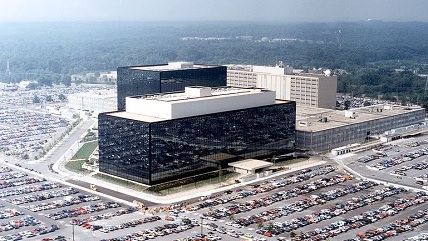Where New Jersey's Senate Candidates Stand on NSA Surveillance, At Least Those Who Bothered to Take an Actual Stand
Reason reaches out to the Senate candidates


The special elections to fill the Senate seat vacated by the death of Frank Lautenberg in New Jersey will be the first federal election since Edward Snowden's disclosure put the NSA's massive domestic surveillance programs into public view. After last week's surprisingly close vote in the House on the Amash amendment, which sought to defund NSA surveillance that targeted Americans who were not under investigation, New York Times reporter Jonathan Martin tweeted asking whether anyone had sought out the positions of Mike Enzi, Wyoming's senator, and Liz Cheney, who will be challenging the Republican in 2014. Greenwald responded by wondering if anyone had reached out to New Jersey's senate candidates, specifically the prolific tweeter Cory Booker. In an effort to find out, we reached out to all six candidates (two Republicans, four Democrats) contesting the summer election.
Two of the Democratic candidates, Rush Holt and Frank Pallone, are actually currently members of the House, although only Holt showed up last Tuesday to vote on the defense spending bill and the 100 amendments to it (including the Amash amendment). Holt says he was "determined to be present for the vote on the [Amash] amendment," for which he voted yes. "I certainly didn't want to miss a close vote in the House, and I wanted to address the issue," he says. Pallone, meanwhile, missed Tuesday's vote, telling the Bergen Record he had "other demands on his time in New Jersey," but that he opposes the NSA's collection practices. A staffer for Pallone said we would get a statement from him elaborating on his stance by yesterday, but a statement was not forthcoming.
Newark mayor Cory Booker, another Democrat, meanwhile, has parroted President Obama's public statements on the NSA, appealing to the need to have a discussion about balancing liberty and security. Steve Lonegan, the former mayor of Bogota and the primary Republican candidate in the race, responded by saying "we had that robust discussion, 237 years ago, it was called the American Revolution and we determined how sacred our privacy is." He says back then America "sent the King packing, and now it's time to send Cory Booker and Barack Obama packing." Booker's website notes the candidate is "deeply troubled" by what Snowden's disclosures revealed, but manages to mention neither the PATRIOT Act nor FISA; Cory Booker's office also said they would get to us with a statement on the issue but did not.
Holt says Booker's posturing on the NSA contributes to the phenomenon where "if you ask progressives in New Jersey is Cory Booker a progressive they'll say oh yes, [and] if you ask moderates is Cory Booker a moderate they'll say oh yes." Holt adds: "Cory Booker is a master at self-promotion who in his marvelous speeches leaves people believing what they want to believe about him, and on this issue it's a little hard to tell." Holt also says that Booker has characterized Holt's efforts to repeal the PATRIOT Act and FISA as "irresponsible." Holt says if he gets elected he would join the "sizable and growing group of progressives in the Senate" pursuing a rollback of the national security state. Holt acknowledges "a few libertarian types" in the Senate are also interested in pursuing that, but only mentions Democrats Ron Wyden and Mark Udall specifically.
The final Democrat candidate, Sheila Oliver, New Jersey's assembly speaker, also appealed to striking a "balance" between security and liberty on her website, calling the NSA's recently revealed operations "a step too far." Her office did not respond to multiple requests for comment.
On the Republican side, Lonegan, who ran unsuccessfully for the GOP nomination for governor in 2005 and 2009, has been vocal about opposition to the NSA's actions. He says that he sees "this use of surveillance as a power grab by the government, using the excuse of 9/11 to undermine our liberties and privacy," and that, along with the IRS scandal and the Department of Justice's invasion of reporters' privacy it was "part and parcel of this trend that we're seeing of government intrusion on our lives." Asked about New Jersey's governor, Chris Christie, who called the "libertarian strain" opposed to the NSA's massive surveillance "dangerous" (because 9/11), Lonegan says he and Christie were "not going to agree on everything, and this is one of the things we're not going to agree on."
Lonegan's only primary opponent, the political newcomer Alieta Eck, also agrees with the Amash amendment. "Government will always favor power and this is why we must favor limited government," she says. "It appears to me that Edward Snowden embarrassed the government by exposing the unreasonable searches of private citizens."
None of the candidates, not the ones who responded to us nor the ones whose positions we gleaned from other public statements, provided a wholehearted endorsement of the NSA's actions, reflecting the agency's lack of popularity among voters. Yet their opinions range from vocal opposition to the abuse of power, like those of Democrat Rush Holt and both Republican candidates, to the reserved appeal to "balance" that parrots the Obama Administration's talking points and may be hard to differentiate from actual support for the NSA's surveillance operations.
The primaries are scheduled for August 13, with the special general election on October 16.
Disclosure: I'm a registered Democrat in New Jersey and plan on voting in these elections.


Show Comments (47)